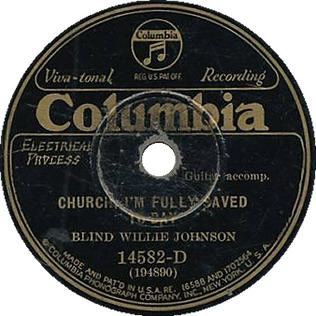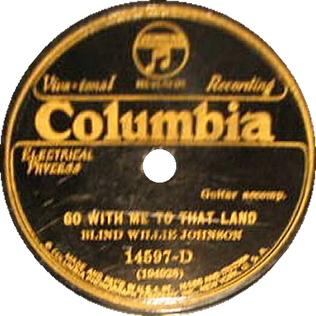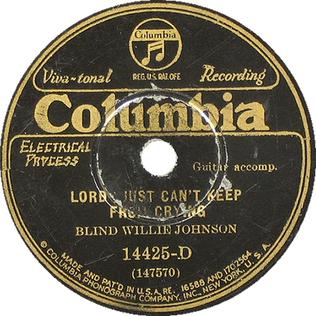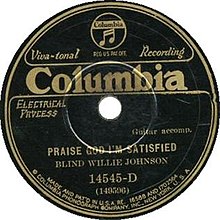Mary Margaret O'Hara is a Canadian singer-songwriter, actress and composer. She is best known for the album Miss America, released in 1988. She released two albums and an EP under her own name, and remains active as a live performer, as a contributor to compilation albums and as a guest collaborator on other artists' albums.

Blind Willie Johnson was an American gospel blues singer, guitarist and evangelist. His landmark recordings completed between 1927 and 1930—thirty songs in total—display a combination of powerful "chest voice" singing, slide guitar skills, and originality that has influenced generations of musicians. Even though Johnson's records sold well, as a street performer and preacher, he had little wealth in his lifetime. His life was poorly documented, but over time, music historians such as Samuel Charters have uncovered more about Johnson and his five recording sessions.

"In My Time of Dying" is a gospel music song by Blind Willie Johnson. The title line, closing each stanza of the song, refers to a deathbed and was inspired by a passage in the Bible from Psalms 41:3 "The Lord will strengthen him upon the bed of languishing, thou wilt make all his bed in his sickness". Numerous artists have recorded variations, including Bob Dylan and Led Zeppelin.

"It's Nobody's Fault but Mine" or "Nobody's Fault but Mine" is a song first recorded by gospel blues artist Blind Willie Johnson in 1927. It is a solo performance with Johnson singing and playing slide guitar. The song has been interpreted and recorded by numerous musicians in a variety of styles, including Led Zeppelin on their 1976 album Presence.

"Dark Was the Night, Cold Was the Ground" is a gospel blues song written and performed by American musician Blind Willie Johnson and recorded in 1927. The song is primarily an instrumental featuring Johnson's self-taught bottleneck slide guitar and picking style accompanied by his vocalizations of humming and moaning. It has the distinction of being one of 27 samples of music included on the Voyager Golden Record, launched into space in 1977 to represent the diversity of life on Earth. The song has been highly praised and covered by numerous musicians and is featured on the soundtracks of several films.

The Soul of a Man is an album of "twenty haunting spiritual blues songs" recorded in the late 1920s and 1930 by the American gospel blues singer and guitarist Blind Willie Johnson that was released by Charly Records in 2003.
"Keep Your Lamp(s) Trimmed and Burning" is a traditional gospel blues song. It alludes to the Parable of the Wise and Foolish Virgins, found in the Gospel of Matthew at 25:1-13, and also to a verse in the Gospel of Luke, at 12:35.

"Bye and Bye We're (or, I'm) Going to See the King" is a Christian song from the African-American musical tradition. It is known by a variety of titles, including "I Wouldn't Mind Dying (If Dying Was All)" and "A Mother's Last Word to Her Daughter". It was recorded seven times before 1930, using the preceding titles.

"Church, I'm Fully Saved To-Day" is a gospel blues song recorded by Blind Willie Johnson in 1930, with backing vocals by Willis B. Harris, sometimes identified as his first wife. It was released on Columbia 14582-D, as B-side to "The Soul of a Man". The song is derived from the hymn "Fully Saved Today" by William J. Henry (words) and Clarence E. Hunter (music), published in 1911, and follows a call-and-response format.

"Go with Me to That Land" or "Come and Go with Me (to That Land)" is a traditional gospel blues song recorded on April 20, 1930 by Blind Willie Johnson with backing vocals by Willis B. Harris, who may have been his first wife. It was released as a single on Columbia 14597-D, backed with "Everybody Ought to Treat a Stranger Right".

"God Don't Never Change" is a gospel blues song recorded by Blind Willie Johnson in 1929. The song is sometimes titled "God Don't Ever Change".

"God Moves on the Water" is a gospel blues song recorded by Blind Willie Johnson in 1929 and released on a 78 rpm record by Columbia Records.
"Trouble Will Soon Be Over" is a traditional gospel blues song recorded in 1929 by Blind Willie Johnson and Willis B. Harris, who is thought to have been his first wife.

"Lord I Just Can't Keep From Crying" is a traditional gospel blues song recorded in 1928 by Blind Willie Johnson and Willis B. Harris (vocals), who is thought to have been his first wife. Some versions of the song recorded by other artists have slightly different titles: for example, a comma after "Lord"; or, "Cryin'" instead of "Crying"; or, an appended "Sometime" or "Sometimes".

"The Rain Don't Fall on Me" is a gospel blues song recorded in 1929 by Blind Willie Johnson and Willis B. Harris (vocals), who is thought to have been Johnson's first wife.

"Leave It There" is a Christian hymn composed in 1916 by African-American Methodist minister Charles A. Tindley. It has become popular enough to have been included in 12 hymnals; and even to be attributed to "traditional" or "anonymous". The title is sometimes given as "Take Your Burden to the Lord and Leave It There" or as "Take Your Burden to the Lord" or as "Take Your Burden", words taken from the song's refrain; the plurals "burdens" and "them" are sometimes used, and "God" instead of "the Lord":

"If It Had Not Been For Jesus" is an American Christian hymn of unknown authorship. It was included in four hymnals published between 1905 and 1938. The title is taken from the first line of the refrain. An alternative title is the first line of the first verse, namely "I Was a Deep Dyed Sinner". The song is unusual in that it is in triple metre, with three beats to the bar. That suggests that the song may have been composed by an individual whose name has been lost, rather than being ascribable only to "traditional".

The Complete Blind Willie Johnson is a compilation album of all the known recordings by American gospel blues singer-guitarist Blind Willie Johnson. As part of the Roots N' Blues series, it was released jointly by Columbia Records and Legacy Recordings, on April 27, 1993. All of the tracks on the two-compact disc set were originally issued by Columbia on the then-standard two-sided 78 rpm record format.

American Epic: The Best of Blind Willie Johnson is a compilation album released to accompany the award-winning American Epic documentary film series. It collects performances from Blind Willie Johnson's five recording sessions for Columbia Records in Dallas, Atlanta, and New Orleans between 1927 and 1930. The album was released as a 16-track download and a vinyl LP.

The discography of Rickie Lee Jones, an American singer, songwriter, and author, consists of 15 studio albums, two live albums, two compilation albums, one extended play, one video album, and 22 singles, on Warner Bros. Records, Geffen Records, Reprise Records, Artemis Records, V2 Records, New West Records, Fantasy Records, Rhino Entertainment, and the Other Side of Desire Records.

















